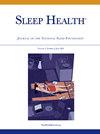南非的就业、收入和睡眠:行动者-合作伙伴相互依存模式方法。
IF 3.4
2区 医学
Q2 CLINICAL NEUROLOGY
引用次数: 0
摘要
研究目的我们分析了南非就业状况、收入和睡眠之间的关系,以解决两个研究问题:(1)就业状况如何影响个人及其伴侣的睡眠量?我们利用南非时间使用研究中 1600 对非洲黑人夫妇的数据,采用行为者-伴侣相互依赖模型来研究夫妇的就业状况、收入和睡眠之间的关系。我们将夜间睡眠分为三类:建议睡眠(7-9 小时)、短时睡眠(9 小时):结果:就业者更有可能获得建议的睡眠时间,而较少出现睡眠时间过长的情况。然而,妻子有工作的男性出现短睡眠的几率几乎是妻子失业男性的两倍,他们出现长睡眠的风险则低 47%。中等收入的男性比低收入的男性有更高的短睡眠风险,而收入最高的男性则更有可能获得建议的睡眠时间:这些结果凸显了在高失业率和性别规范不断变化的背景下,男性和女性在管理就业需求和确保经济稳定之间错综复杂的动态关系。本文章由计算机程序翻译,如有差异,请以英文原文为准。
Employment, income, and sleep in South Africa: An actor-partner interdependence model approach
Objective
We analyze the relationship between employment status, income, and sleep in South Africa to address two research questions: (1) How does employment status influence the sleep quantity of the individual and their partner? (2) How does income impact the sleep quantity of the individual and their partner?
Method
Using data from 1600 Black African couples in the South African Time Use Study, we employ the Actor-Partner Interdependence Model to investigate the relationship between employment status, income, and sleep in couples. We categorize nighttime sleep into three categories: recommended sleep (7-9 hours), short sleep (<7 hours), and long sleep (>9 hours).
Results
Employed individuals were more likely to get the recommended amount of sleep and less likely to experience long sleep. However, men whose wives are employed are almost twice as likely as men whose wives are unemployed to experience short sleep, and they experience 47% lower risk of long sleep. Men with a medium level of income have a higher risk of short sleep than those with low income, while those in the highest income category are more likely to get the recommended amount of sleep.
Conclusion
These results highlight the intricate dynamics between managing employment demands and securing economic stability for both men and women in the context of high unemployment and shifting gender norms.
求助全文
通过发布文献求助,成功后即可免费获取论文全文。
去求助
来源期刊

Sleep Health
CLINICAL NEUROLOGY-
CiteScore
6.30
自引率
9.80%
发文量
114
审稿时长
54 days
期刊介绍:
Sleep Health Journal of the National Sleep Foundation is a multidisciplinary journal that explores sleep''s role in population health and elucidates the social science perspective on sleep and health. Aligned with the National Sleep Foundation''s global authoritative, evidence-based voice for sleep health, the journal serves as the foremost publication for manuscripts that advance the sleep health of all members of society.The scope of the journal extends across diverse sleep-related fields, including anthropology, education, health services research, human development, international health, law, mental health, nursing, nutrition, psychology, public health, public policy, fatigue management, transportation, social work, and sociology. The journal welcomes original research articles, review articles, brief reports, special articles, letters to the editor, editorials, and commentaries.
 求助内容:
求助内容: 应助结果提醒方式:
应助结果提醒方式:


